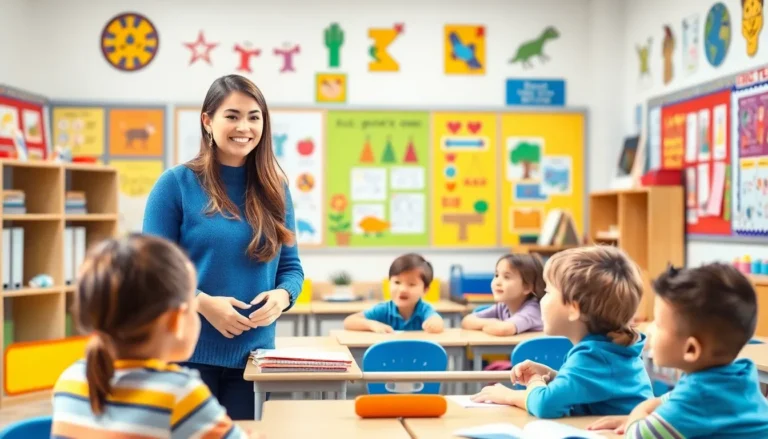Nestled in the heart of St. Helena, a unique educational gem awaits parents eager to give their children a head start in life. St. Helena Montessori isn’t just another school; it’s a vibrant community where learning feels like an adventure. Imagine a place where kids can explore their interests, cultivate their creativity, and—let’s be honest—actually enjoy school. Sounds too good to be true, right?
Table of Contents
ToggleOverview of St Helena Montessori
St. Helena Montessori serves as a cornerstone of innovative education in St. Helena. This school embraces the Montessori method, fostering an environment rich in exploration and self-discovery. Students engage with diverse learning materials, promoting creativity and critical thinking.
Children participate in hands-on activities that enhance their natural curiosity. Facilities provide access to a variety of educational resources, such as outdoor classrooms and art studios. Instruction emphasizes individualized learning plans, allowing each child to progress at their own pace.
Teachers at St. Helena Montessori guide rather than direct, supporting learners in navigating their educational journeys. The small class sizes facilitate personalized attention, ensuring that every child’s needs receive consideration.
Families appreciate the strong community ties and the emphasis on social development. Weekly events and parent workshops offer opportunities for involvement and connection among families.
Curriculum components include practical life skills, language, mathematics, and cultural studies. These subjects encourage holistic development, nurturing well-rounded individuals.
St. Helena Montessori stands out by creating a nurturing atmosphere that caters to each child’s unique abilities. Different learning styles are respected, preparing students for lifelong learning and success.
History and Philosophy

St. Helena Montessori embodies the principles of the Montessori method, which emphasizes child-led learning and hands-on experiences. This educational philosophy fosters independence and a love for learning among students.
Foundations of Montessori Education
Maria Montessori established the Montessori method in the early 1900s, focusing on child development through specific educational principles. Active exploration and sensory experiences form the backbone of this approach. Classrooms featuring carefully prepared environments allow children to engage meaningfully with their surroundings. Teachers act as facilitators, observing each child’s progress and interests. Learning materials cater to various developmental stages, fostering individual growth and collaboration. Practical life skills build confidence and help children navigate their world effectively.
Development of St Helena Montessori
St. Helena Montessori opened its doors in the early 2000s, aiming to create a supportive environment for children in the St. Helena community. The school expanded its programs to include diverse learning opportunities, prioritizing hands-on activities and community engagement. A strong focus on arts, nature, and culture enhances the curriculum, aligning with Montessori values. Outdoor classrooms and local partnerships enrich students’ education with unique experiences. Parent involvement plays a crucial role in shaping the school’s vibrant community, facilitating various events and workshops. As the school continues to grow, its commitment to individualized learning remains at the forefront.
Curriculum and Programs
St. Helena Montessori offers a comprehensive curriculum tailored to foster children’s growth through exploration and self-directed learning.
Age Groups and Class Structure
Classes at St. Helena Montessori cater to various age groups, typically encompassing children aged 2.5 to 6 years. Learning environments promote interactions among different ages, allowing younger students to learn from their older peers and vice versa. Class sizes remain small to ensure personalized attention, with one teacher for every 10 to 12 students. This structure encourages collaboration while supporting individual learning needs. Programs transition smoothly from preschool to kindergarten, allowing children to progress at their own pace while developing social and academic skills.
Key Learning Areas
Core subjects emphasize practical life skills, language, mathematics, and cultural studies. Practical life activities enable children to develop fine motor skills through tasks like pouring and sweeping. Language development occurs through storytelling, vocabulary games, and writing exercises that enhance literacy. Mathematics focuses on hands-on materials for understanding concepts, fostering numerical fluency. Cultural studies introduce students to geography, history, and diverse traditions worldwide, promoting global awareness. This holistic approach nurtures well-rounded individuals prepared for lifelong learning and success.
Benefits of St Helena Montessori
St. Helena Montessori offers numerous advantages for children’s education by creating an enriching environment that promotes growth and exploration.
Personalized Learning Experience
A personalized learning approach allows each child to progress according to their unique needs and interests. Teachers facilitate rather than instruct, encouraging independent thinking and creativity. Individual learning plans cater to specific developmental stages, helping children achieve their personal goals. Small class sizes, typically one teacher for every 10 to 12 students, enhance the focus on each child’s journey. Children engage with a variety of materials that resonate with their preferences, fostering a deep, intrinsic motivation for learning. This individualized attention strengthens relationships between educators and students, contributing to a supportive atmosphere that nurtures their educational growth.
Holistic Development
Holistic development plays a significant role in the curriculum at St. Helena Montessori, addressing academic, social, and emotional growth. Practical life skills are integrated alongside core subjects like language, mathematics, and cultural studies. Children learn to navigate real-world scenarios, building confidence and independence. Activities designed to enhance fine motor skills promote dexterity, while group interactions foster social skills and empathy. Exposure to art, nature, and community initiatives broadens children’s perspectives, encouraging well-rounded citizens. This comprehensive approach prepares students for lifelong learning by integrating essential skills within the context of their personal interests and experiences.
Community Engagement
St. Helena Montessori thrives on its strong community bonds, encouraging active involvement from families and local organizations. Parents engage in various activities, enhancing school events and enriching the learning environment. Weekly events, such as family workshops and community service projects, foster deeper connections among families, strengthening the sense of belonging.
Teachers invite local experts to share their skills and knowledge, offering students real-world insights. Local farmers, artists, and engineers contribute by conducting workshops focused on practical life, arts, and cultural studies. Students participate in these experiences, expanding their understanding beyond the classroom.
Collaboration with nearby organizations enhances educational opportunities. Partnerships with art studios and nature centers allow students to explore diverse learning experiences. These collaborations promote holistic growth, aligning perfectly with the school’s Montessori philosophy.
Community engagement also takes form through volunteer opportunities. Families are encouraged to participate in school activities, enhancing their connection to the educational process. Parents often share their talents, such as organizing special events or leading classes based on their expertise.
St. Helena Montessori promotes sustainability through community initiatives. Students engage in projects like gardening and recycling, instilling a sense of responsibility toward the environment. Collaborating with local environmental groups further deepens this commitment.
Together, these efforts create a vibrant atmosphere where students, families, and community members share ideas and resources. St. Helena Montessori nurtures a culture of inclusivity, ensuring everyone plays a vital role in shaping the school’s educational landscape. This active involvement directly impacts the students’ experiences, enriching their learning journeys while developing essential life skills.
St. Helena Montessori stands out as a nurturing environment where children thrive through exploration and self-directed learning. Its commitment to the Montessori method fosters independence and creativity while promoting holistic development. With a focus on individualized learning plans and small class sizes, each child’s unique needs are met, ensuring they progress at their own pace.
The strong community ties and active parental involvement create a vibrant atmosphere that enhances the educational experience. Through collaboration with local organizations and hands-on activities, students gain valuable insights and skills that prepare them for the future. St. Helena Montessori not only cultivates a love for learning but also equips children with essential life skills, making it an exceptional choice for families seeking a well-rounded education.






